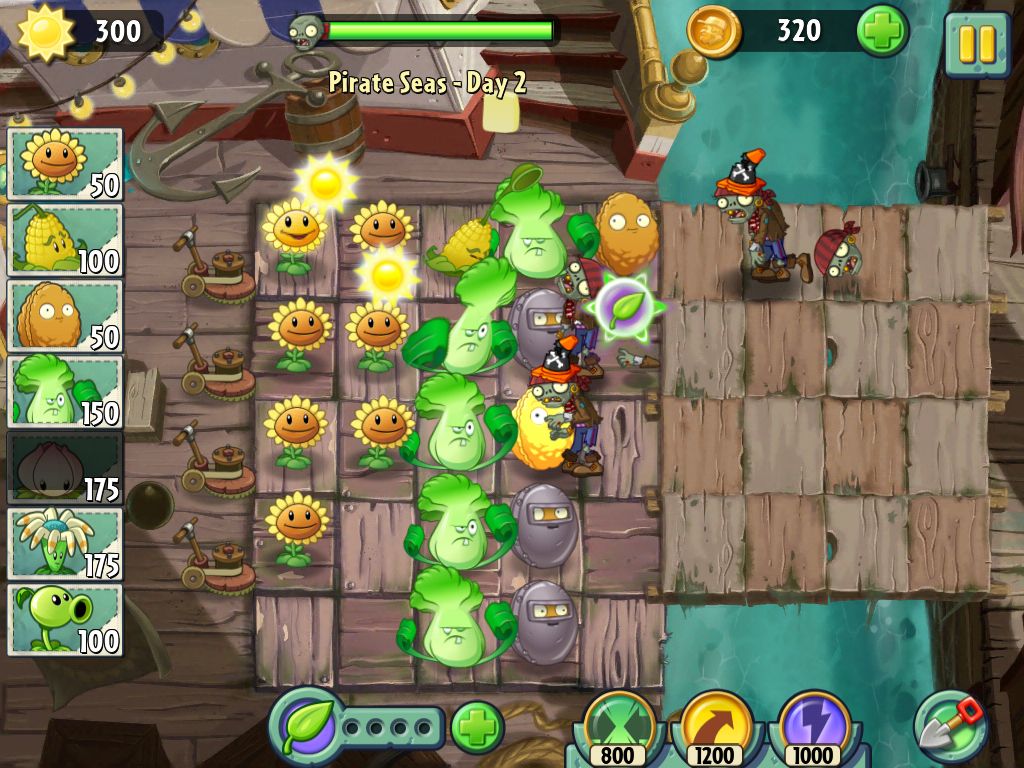
Free-to-play hasn't ruined Plants vs Zombies. It has, however, made it much more of a grind.
The trouble with F2P is that so many games have their design structured around micro-transactions. Many games deliberately, cynically hold players back in order to encourage them to spend.
PopCap's solution is a little different, but at times - and particularly in light of this sequel's significantly sharper difficulty curve - that all-important charm, the reason we fell in love with an otherwise fairly straightforward tower defence game in the first place, is lost.
Pharoah nuffTake, for example, your progress through the first world: Ancient Egypt. There's a path straight to the next area, with 11 levels to complete. I finished the majority on my first attempt, but needed a couple of shots at the final two or three stages.
With the last wave of Stage 11 finally vanquished, I was looking forward to tackling the pirate-themed world, only to be informed that I'd need 11 more stars to unlock it - or I could pay £2.99 / $4.99 if I didn't fancy going back.
At this stage, several of the levels I'd already beaten suddenly had new objectives to complete, with three stars to collect on each. Yet it's only possible to collect a single star on each attempt, meaning I'd have to complete several levels multiple times to move forward.
I could, of course, venture off the beaten track and tackle some of the bonus stages for extra stars, but then I'd need to find keys to unlock the gates to reach them. And how to obtain these keys? Why, by playing levels over again until they drop.
With 12 keys to unlock all the extra paths on the first world alone, that's a lot of repetition. More so when you factor in the difficulty in obtaining the third stars of each stage in particular.
Power plantNow, credit where it's due - these additional objectives subtly transform the strategies you need to employ, and alleviate a little of that repetition. In some stages you'll only be able to spend a certain amount of sun on new plants, while others require you to win without losing more than a single unit.
The addition of Plant Food, too, is a smart idea that adds an extra layer of strategy. This is dropped by glowing zombies - or you can spend 1,000 in-game coins each time you need it - and it gives your plants a boost, the effects varying from one to the other.
Peashooters, for example, fire a ferocious volley of projectiles for a few seconds, Wall-nuts gain an extra-hard shell that makes them even tougher to crack, while the Cabbage-pult unleashes a wide area attack that can take down several zombies at once.
You can also spend that in-game cash on power-ups, pinching zombies between your fingers to pop their heads off, or tracing your finger through them to zap them with a fatal dose of electricity.
You'll need to use them judiciously, mind - they're costly, and you'll have to shell out real money if you want to use them more than once or twice every few stages.
Bonk's adventureIt's beautifully presented, too: polished, bright, and characterful, and the new plants have personality packed into each and every animation. I'm particularly fond of Bonk Choy, who aggressively thumps zombies within range of his leafy fists, finishing them off with a satisfying uppercut.
He is, however, a little overpowered. After experimenting with a few of the new plants, I hit upon a tactic whereby I'd place a Wall-Nut on every row, with a Bonk Choy just behind, and use any Plant Food I collected to protect that defensive wall from being munched away too quickly.
This strategy worked for an alarming number of levels, and became my reliable fail-safe when returning to some of the trickier star challenges, even as I endeavoured to experiment with new plants, for the sake of variety if nothing else.
Growing painsWhat concerns me most about Plants vs Zombies 2 is that a large part of the original game's fanbase will find the difficulty level far too high without paying to ease the agony of repeated failures.
While just about everything available in the store from the start can be unlocked by simply playing through the game, I imagine younger gamers in particular will be pestering their parents for the money to buy some of the new plants.
Just seeing them in the store will be temptation enough for many, and that's before you take into account the intrusive adverts that periodically pop up, offering temporary reductions on certain items. That's business, I guess.
Seeds of doubtBut perhaps the most irritating thing is that the pacing of the game would probably be perfect if you weren't forced to go back and grind so much. New plants appear on the map at regular intervals, and yet you're often arbitrarily held back from accessing them, asked to cough up or play levels over and over until you're fed up with them.
It's a shame, because underneath it all, Plants vs Zombies 2 develops on the first game's ideas in smart and meaningful ways. Once you've unlocked the majority of the plants, it becomes much more enjoyable, and those who conquered the original with ease will relish the much-tougher challenge.
As a result, it comes recommended to more experienced players with a high tolerance for repetition. Beginners or newcomers, however, may find their wallets much lighter - or their blood pressure higher - by the time they've finished.
Plants vs Zombies 2

